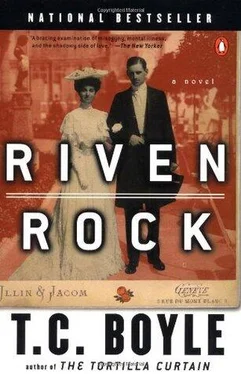T. Boyle - Riven Rock
Здесь есть возможность читать онлайн «T. Boyle - Riven Rock» весь текст электронной книги совершенно бесплатно (целиком полную версию без сокращений). В некоторых случаях можно слушать аудио, скачать через торрент в формате fb2 и присутствует краткое содержание. Год выпуска: 1999, Издательство: Penguin Books, Жанр: Современная проза, на английском языке. Описание произведения, (предисловие) а так же отзывы посетителей доступны на портале библиотеки ЛибКат.
- Название:Riven Rock
- Автор:
- Издательство:Penguin Books
- Жанр:
- Год:1999
- ISBN:нет данных
- Рейтинг книги:5 / 5. Голосов: 1
-
Избранное:Добавить в избранное
- Отзывы:
-
Ваша оценка:
- 100
- 1
- 2
- 3
- 4
- 5
Riven Rock: краткое содержание, описание и аннотация
Предлагаем к чтению аннотацию, описание, краткое содержание или предисловие (зависит от того, что написал сам автор книги «Riven Rock»). Если вы не нашли необходимую информацию о книге — напишите в комментариях, мы постараемся отыскать её.
Riven Rock — читать онлайн бесплатно полную книгу (весь текст) целиком
Ниже представлен текст книги, разбитый по страницам. Система сохранения места последней прочитанной страницы, позволяет с удобством читать онлайн бесплатно книгу «Riven Rock», без необходимости каждый раз заново искать на чём Вы остановились. Поставьте закладку, и сможете в любой момент перейти на страницу, на которой закончили чтение.
Интервал:
Закладка:
“Ayeh,” the old man replied.
“I fished once,” Stanley said. “In the Adirondacks, when I was a boy. The guide said I should be proud.”
The old man said nothing. He spat in the water, a circle of concentrated spittle, minuscule bubbles, floating there on the unbroken surface like something else altogether, like jism, sperm, spunk. The float twitched at the end of the line, plunged suddenly, and the old man snatched it back with a whip of the rod, the line hissing through the sunlit air, but there was nothing there, not even a fish’s disappointed lips, no bait fish either, just a hook. “That one,” Stanley observed, “got away. ”
A look, that was all: the old man gave him a look. “Ayeh,” he said, fishing a minnow from the bucket beside him and impaling it on the wickedly curved device of the hook, where it wriggled in its pain, fishy pain, a pain not worth mentioning, dumb animals and dumber. And then the float shot through the air and slapped the water like the flat of a hand— thwap! — and in that moment Stanley’s mind failed him.
What happened next is entirely from the fisherman’s point of view because Stanley was no longer, in a sense, there. But the fisherman got wet, tattooed by those hard horny shoes and then lifted right out of his collar and flung into the cold clean enveloping water. And he damned near drowned too, what with the cold and the weight of his clothes and boots, but it was his own two arms and legs and the McCormick money that saved him and hushed him and made him comfortable in the declining years of his old man’s life.
Katherine was upset — no, distraught would be more accurate. For days on end she had no one to talk to but the servants, Stanley haunting the place like a revenant, as silent as if he’d had his tongue cut out. They were together, yes, and he seemed calmer (but for the single terrifying incident with the fisherman at the boat dock), and yet he was more remote than ever. There would be nothing from him, no spark, no animation at all, and for hours he’d be gone in the forest or obsessively chopping wood — wood enough for a village — and he’d pass right by her as if she didn’t exist. That was the hardest thing. That made the breath catch in her throat and it darkened the room and put out the sun in the sky.
And then the next day he’d walk into the room completely transformed. “Katherine,” he’d say, “do you remember that woman with the funny little dog in Nice?” and go off on a fascinating reminiscence of all the dogs in his life — and hers, because hadn’t she had dogs too? He would be attentive and affectionate, taking her arm when they went in to dine, rowing her round the lake for hours — no, no, she wasn’t to touch an oar — getting up from his reading to adjust the pillow behind her head. Sometimes this would go on for days and her hopes would leap up. The long face was gone, the muttering, the halting walk, the whinnying laugh: he was Stanley again, her Stanley, Stanley of the charm and sweetness and concern. She reveled in his smile, his dimples, the way his eyes seemed to reach out and hold her. He was hers. All hers.
“What do you think of Jack London?” he asked one morning when they were lying on a blanket in a meadow, the sun palely warming, the season crashing down all round them. He was lying on his side, his head propped up on one hand, a stalk of yellowed grass between his teeth.
Katherine had been reading desultorily in a book of Wallace‘s— The Malay Archipelago —that one of her professors had particularly recommended. She was planning to begin graduate research during the winter semester, once Stanley had recovered. Her hand was clasped in his. She looked up from her book and into the blue sheen of his eyes. “Oh, I don’t know,” she said. “I certainly like him for his social consciousness, but as for his adventure stories… well, I guess I prefer stories about proper people, Edith Wharton, that sort of thing. You know I do.”
“He’s a real he-man,” Stanley said.
She looked at him, looked into his eyes, his grin. “Yes,” she said, “I suppose he is.”
“Chasing after gold, mushing dogs, risking everything.” He glanced away from her, at the line of trees at the edge of the meadow, one flame of motionless color. “I’m not like him at all,” he said, dropping his voice. “I‘m — I’m — I’ve been pampered and coddled all my life, up to my ears in my father’s m-money. I haven’t accomplished a thing, not the smallest thing, not even on my ranch. I’m not a he-man. I’m not even a man.”
“Oh, Stanley, you are, you are —”
He couldn’t look at her. “Not to you I’m not.”
She slid a hand up over his shoulder and gently, very gently — hold your breath, Katherine, hold your breath now — laid her cheek against his. “I love you, Stanley,” she whispered.
“I feel—” he began and trailed off.
“You will be a man to me, Stanley, I know you will. You just need to… relax.”
Cheek pressed to cheek, the sky all around them, the trees, the silence. “I feel better now,” he said.
She lifted her head so she could look into his eyes, the softest fragmentary wisp of a smile playing across her lips. “Do you think we could—?” she whispered.
A trace of panic. “Here? Out-outside?”
She held him to her.
“In the light?”
It wasn’t ideal. It wasn’t even natural. And it was a failure, absolute, unmitigated, beyond hope or repair. He managed, after an eon and a half of fumbling and apologizing and kissing her ear so assiduously it ached for days afterward, to pull her dress up and her bloomers down and to work himself out of his trousers, but when it came to the blind impulsive moment of insertion, of becoming one with her after all, he shrank back and she felt nothing but a premature wetness and a grasping yearning sucking drain of emptiness that would never, in all her natural life, be stopped or plugged or filled.
So the years went by, years of abstinence and denial, a withdrawal from the world of men so complete that Katherine became a kind of prisoner herself, Mrs. Stanley Robert McCormick, married and yet not widowed, attached to a man and yet detached from him too. Jane helped. Her mother helped. NAWSA and the American Birth Control League and the War Service Department, they all helped. But the fact was, she turned fifty-two years old in 1927, and as far as men were concerned she might as well have been a nun. Sexual love — heterosexual love, procreative love — was a thing she would never experience, she was resigned to that, but beyond sexual love there was dutiful love, a platonic and idealized love, and when her activism flagged, when the speeches became repetitive and the speakers crabbed and insipid, she thought of Stanley. Still. After all these years. Was it even love at this point, she wondered, or just curiosity? She managed his affairs with the fierce uncompromising zeal she’d brought to NAWSA and the birth control movement and saw that he was provided with the best of everything, and she wrote him and spoke with him on the phone, but it was all an abstraction. She wanted to see him, just see him, and that was what Kempf had promised her.
Dr. Kempf. The new man. The Freudian. The profligate who cost as much as any six doctors combined, and yet she’d gone along with the other guardians (Stanley’s brother Cyrus and his sister Anita, Favill having passed on and Bentley retired, thank God) and hired him. Anything was better than stasis and cynicism, even at ten thousand dollars a month.
It took him over a year, but finally, in the fall of 1927, after she’d sent all the delegates home, closed up Prangins for the winter and smuggled her trunks of diaphragms through customs, he wired her to say that the time had come. Stanley had undergone a radical transformation through analysis, his hatred of his tyrannical father and fear and mistrust of his emasculating mother out in the open, his misogyny examined from every perspective, his knowledge of himself and his phobias brought into line, and he was now ready, if not to take up ballroom dancing or reinvigorate the International Harvester Company, at least to entertain and comport himself as a gentleman with members of the opposite sex. He was ready. But Dr. Kempf— Edward, call me Edward —felt it only right that she, Katherine, should be the first woman in two decades her husband would lay eyes on — see, that is — and perhaps even, if conditions were right, touch.
Читать дальшеИнтервал:
Закладка:
Похожие книги на «Riven Rock»
Представляем Вашему вниманию похожие книги на «Riven Rock» списком для выбора. Мы отобрали схожую по названию и смыслу литературу в надежде предоставить читателям больше вариантов отыскать новые, интересные, ещё непрочитанные произведения.
Обсуждение, отзывы о книге «Riven Rock» и просто собственные мнения читателей. Оставьте ваши комментарии, напишите, что Вы думаете о произведении, его смысле или главных героях. Укажите что конкретно понравилось, а что нет, и почему Вы так считаете.












